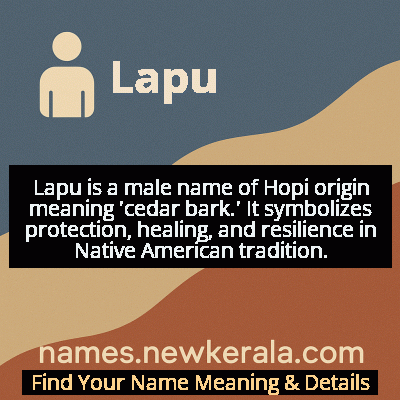Lapu Name Meaning & Details
Origin, Popularity, Numerology Analysis & Name Meaning of Lapu
Discover the origin, meaning, and cultural significance of the name LAPU. Delve into its historical roots and explore the lasting impact it has had on communities and traditions.
Name
Lapu
Gender
Male
Origin
American
Lucky Number
5
Meaning of the Name - Lapu
Lapu is a male name of Hopi origin meaning 'cedar bark.' It symbolizes protection, healing, and resilience in Native American tradition.
Lapu - Complete Numerology Analysis
Your Numerology Number
Based on Pythagorean Numerology System
Ruling Planet
Mercury
Positive Nature
Adventurous, dynamic, curious, and social.
Negative Traits
Restless, impatient, inconsistent, prone to indulgence.
Lucky Colours
Green, white.
Lucky Days
Wednesday.
Lucky Stones
Emerald.
Harmony Numbers
1, 3, 9.
Best Suited Professions
Sales, marketing, travel, entertainment.
What People Like About You
Versatility, charisma, adventurous spirit.
Famous People Named Lapu
Lapu Lapu
Tribal Chieftain
Led the first successful resistance against Spanish colonization in the Philippines
Lapu Lapu Camacho
Cultural Preservationist
Documented and preserved traditional Hopi medicinal practices
Lapu Whitefeather
Environmental Activist
Founded the Cedar Protection Alliance
Name Variations & International Equivalents
Click on blue names to explore their detailed meanings. Gray names with will be available soon.
Cultural & Historical Significance
Historically, names referencing natural elements like cedar bark were given to signify the child's intended role or characteristics within the tribal structure, often indicating a future as a protector or healer. The name Lapu also reflects the Hopi worldview that emphasizes harmony with nature and the understanding that humans are part of the natural world rather than separate from it. This connection to cedar specifically ties the name to practical wisdom—cedar bark has been used for centuries in construction, medicine, and spiritual practices, making it a symbol of both practical utility and sacred significance.
Extended Personality Analysis
Individuals named Lapu are typically perceived as grounded, protective, and resilient, much like the cedar tree from which the name derives. They often exhibit strong nurturing instincts and a natural inclination toward caring for others, whether through physical protection, emotional support, or guidance. Their personality is marked by steadfastness and reliability—they are the people others turn to in times of crisis. Lapu bearers tend to be deeply connected to tradition and family, valuing stability and continuity. They often possess a quiet strength that doesn't need to announce itself but becomes evident through consistent action and loyalty.
While they may appear reserved initially, they reveal profound wisdom and compassion to those who earn their trust. Their protective nature extends beyond immediate family to their broader community, making them natural leaders in preserving cultural heritage and environmental stewardship. People with this name often demonstrate remarkable patience and the ability to endure challenges without losing their core values. They tend to be practical problem-solvers who approach difficulties with a calm, methodical mindset. The cedar's association with purification also suggests that Lapu individuals often help others through emotional or spiritual cleansing, offering clarity and renewal during turbulent times.
Modern Usage & Popularity
In contemporary times, Lapu remains a relatively uncommon name primarily used within Native American communities, particularly among Hopi and other Southwestern tribes. Its usage has seen a slight increase as part of the broader movement toward reclaiming indigenous names and cultural identity. The name is most frequently given to boys, maintaining its traditional masculine association with protection and strength. While not appearing on mainstream popularity charts, Lapu has gained some recognition through cultural education programs and the work of indigenous activists. Modern parents choosing this name often do so to honor their heritage and instill values of environmental stewardship and cultural preservation in their children. The name's rarity outside indigenous communities reflects both cultural specificity and the ongoing efforts to protect traditional naming practices from cultural appropriation.
Symbolic & Spiritual Meanings
Symbolically, Lapu represents protection, healing, and enduring strength. The cedar bark reference connects to the tree's ability to withstand harsh conditions while providing shelter and medicine. Metaphorically, it signifies being a 'protector' or 'guardian'—someone who creates safe spaces for growth and healing. The name also carries connotations of purification, as cedar is traditionally used in cleansing rituals. Like the cedar tree that remains evergreen through all seasons, Lapu symbolizes resilience and eternal connection to one's roots and traditions. The bark itself represents the outer layer that protects the inner life, suggesting someone who provides a protective barrier for their community while maintaining deep spiritual connections. This symbolism extends to representing the interface between the physical and spiritual worlds, much like how bark mediates between a tree's inner vitality and the external environment.

